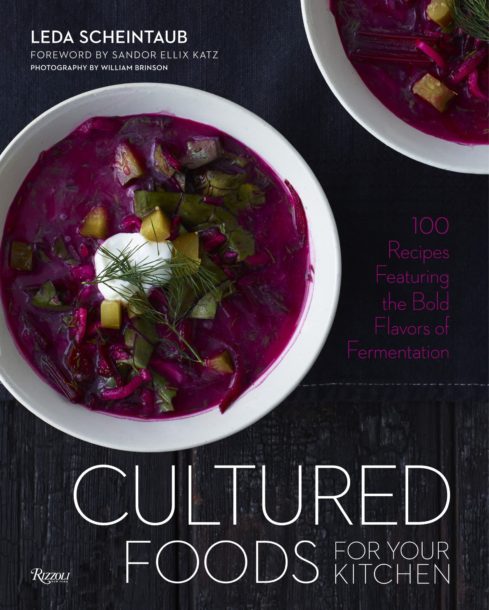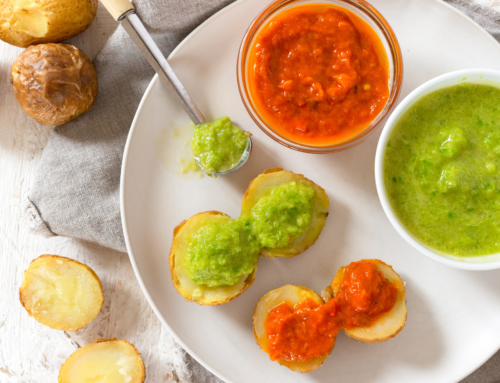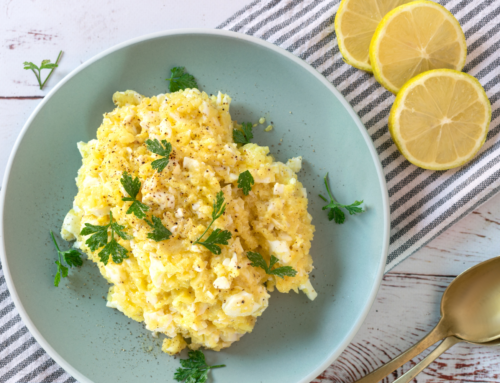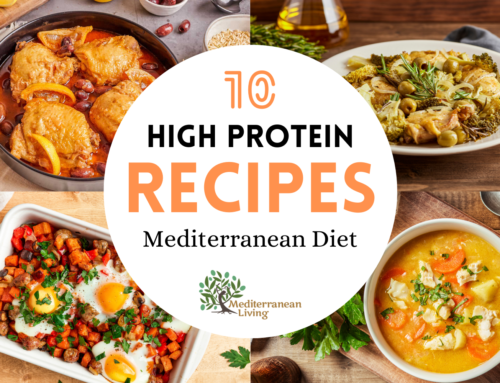Cultured Foods For Your Kitchen
By Christine Dutton
Updated October 6, 2015
Cultured Foods For Your Kitchen: 100 Recipes Featuring The Bold Flavor of Fermentation
Photo Credit: William Brinson
I recently discovered Leda Scheintaub’s beautiful cookbook, Cultured Foods For Your Kitchen: 100 Recipes Featuring the Bold Flavors of Fermentation, while visiting Leda and her husband Nash’s restaurant, Dosa Kitchen in Brattleboro, Vermont. After reading so much about the benefits of eating cultured foods, I wanted to explore making my own fermented foods. All of the recipes I’ve tried have been delicious. This book is an intelligent and engaging exploration of fermentation. The book guides you through creating your own ferments to use in the recipes, or you can use store bought fermented foods. So, you can pick a recipe that matches your current energy! It was a pleasure to interview Leda and share more about her book and ferments with the Mediterranean Living community.
Photo Credit: Elizabeth Ungerleider
Christine: Describe your cookbook to us. What should readers expect?
Leda: Cultured Foods for Your Kitchen draws on the traditions of fermenting from around the world, offering my favorite ways of incorporating cultured foods into everyday cooking. It not only teaches you how to ferment, but it shares with you how to build a recipe around these bold-flavored foods. First you’ll find recipes for versatile building block ferments—sauerkraut, kimchi, cucumber pickles, root vegetables, yogurt, kefir, and kombucha, then you’ll find it organized like a typical cookbook—with chapters from breakfast to beverages, salads, mains, and desserts—all based around cultured foods.
Christine: What inspired you to write Cultured Foods?
Leda: When I first experimented with culturing a decade and a half ago, home fermentation was fairly fringe. Now this ancient art is catching the public’s eye, and more and more people are keen on expanding their culinary repertoires by adding the salty, sour, tangy, tart flavors of fermented foods. The time seemed ripe to share the recipes I’d been gathering over the years.
Christine: What are some of the benefits of cultured foods?
Leda: Enjoying live cultured foods is the most effective way of getting in your probiotics, as ferments are more powerful and less costly than any supplement you’ll find on the shelf. Many people know that ferments are beneficial for the digestion, but it goes beyond that, to our whole mind-body system. Ferments can also function as antioxidants and immune boosters, and they can increase the nutrition in a food and even create new nutrients. Just make sure the words “live,” “raw,” or “contains living cultures” are on the label when you shop for ferments—anything that’s on the shelf is likely pasteurized and contains no living cultures. Or go for it and make your own.
Christine: Which recipes would you recommend to someone cooking with cultured foods for the first time?
Leda: Making cucumber pickles is so easy. Make a brine by mixing salt into water, throw in some pickling cukes, wait a week, and you have pickles! Kefir is another great starter ferment—add the kefir culture to milk, leave overnight, strain, and you’ve got a kefir that’s more vibrant than anything you’ll find in the store.
Christine: What did you enjoy most about writing this book?
Leda: I loved writing from the first person and sharing recipes from my heart. After many collaborations on celebrity and TV show cookbooks, this is my first solo work.
Christine: What makes your cookbook special?
Leda: It makes fermentation accessible to everyone, whether you’re a fermentation aficionado or completely new to the craft of culturing. If you are a lover of kitchen projects, you can make your ferments from scratch, but if going DIY is not for you, that’s fine too—you can skip ahead to the recipe section, where you’ll find dozens of ferment-centered recipes that can be made using store-bought cultured products. I’d also like to say that my publisher, Rizzoli, made this book truly special. It got a lot of love from my two editors, and the elegant photos turned it into the first coffee table book on fermentation.
Christine: How do you think this type of cooking fits in with Mediterranean Diet & Lifestyle?
Leda: Since the Mediterranean Diet is one of the healthiest diets in the world, it would make sense that adding ferments, one of the healthiest foods you can eat, only makes it better!
Christine: What are the benefits of making your own cultured foods and cooking with them?
Leda: Making your own ensures the highest quality. You get to use organic and local produce and the best sea salt your pocketbook can afford. Making your own kefir and yogurt ensures that you’re getting the most probiotic punch, as you, not the packager, are in control of the fermentation process. And you’ll save lots of money.
Christine: What kinds of equipment are most essential for cooking from Cultured Foods?
Leda: Mason jars (ceramic crocks if you’re doing large batches), weights such as a beautiful stone from a nearby river, a pounder for turning cabbage into sauerkraut, and kitchen tape and markers (you’ll thank yourself months later for labeling what otherwise might have become “mystery jars”).
Christine: What is the biggest mistake people make when cooking with cultured foods?
Leda: Heating them above 110 degrees or so, and thus killing their beneficial bacteria.
Christine: What is the most important bit of wisdom you have received about cooking with cultured foods?
Leda: That it is an extremely safe and simple method of food preparation.
Christine: What dish using cultured foods do you most turn to for comfort?
Leda: Dosas (South Indian fermented rice and lentil crepes), almost daily!
Christine: What cookbooks do you find you cook from again and again?
Maya Kaimal’s Savoring the Spice Coast of India and Curried Flavors.
Christine: What do you enjoy when not cooking or writing cookbooks.
Leda: Is there really anything else to do?
Christine: Tell us about some of your upcoming projects.
Leda: My husband Nash Patel and I are working together on writing The Dosa Kitchen Cookbook. It’s based on our eponymous food truck based in Brattleboro, Vermont.
Christine: What will you be making for dinner tonight?
Saffron and Chicken Herb Salad from Ottolenghi and Tamimi’s Jerusalem.
Christine: Thank you so much for spending time talking with me about cultured foods and your fabulous book! I have enjoyed experimenting with your great recipes!
We are delighted to share Leda’s recipe for Italian Giardiniera over at our Mediterranean Living Recipe Box.
Leda Scheintaub is the author of Cultured Foods for Your Kitchen: 100 Recipes Featuring the Bold Flavors of Fermentation (Rizzoli, 2014). She is also the author, with Whole Foods Encyclopedia author Rebecca Wood, of The Whole Bowl: Gluten-Free, Dairy-Free Soups and Stews (Countryman Press, 2015). You can visit her at www.ledaskitchen.com. Leda and her husband, Nash Patel, run Dosa Kitchen, a farm-to-truck Indian eatery based in Brattleboro, Vermont. You’ll find them at www.dosakitchen.com and on Facebook, Twitter, and Instagram. The two of them currently are collaborating on the Dosa Kitchen Cookbook.













Gail says:
Jeanmarie Petrino says:
Ursula says: